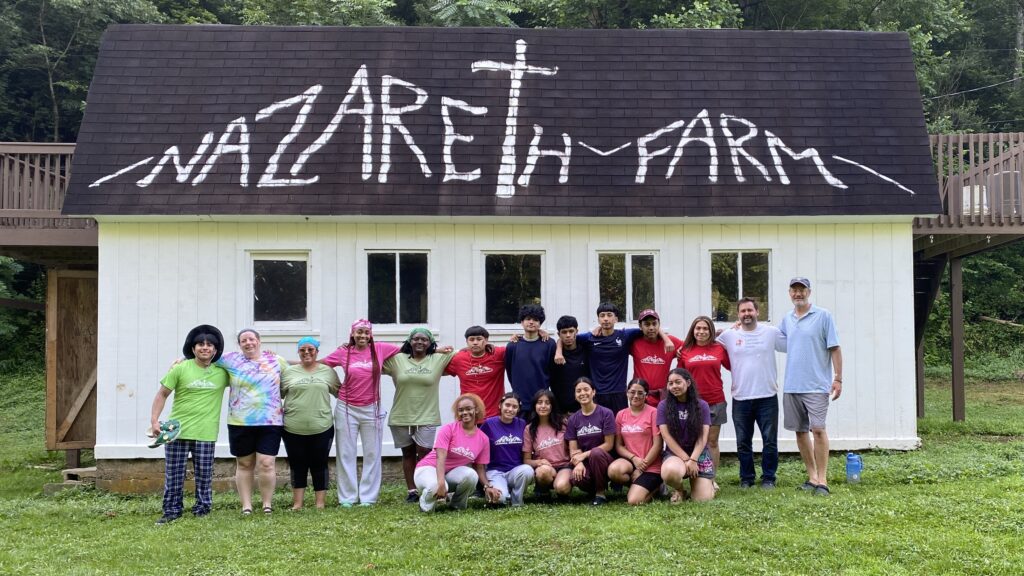Cristo Rey St. Martin’s recent immersion trip to Nazareth Farm in rural West Virginia brought ten students and three adults into a week of life-changing experiences centered around the Farm’s four cornerstones – simplicity, service, community, and prayer. For many, it was a journey into both the heart of Appalachia and their own faith.
Founded in 1979, Nazareth Farm operates as a Catholic community seeking to live the Gospel in an intentional and thought-provoking way, welcoming high school and college students throughout the year. Volunteers work alongside local residents in Doddridge County, building porches, roofing homes and repairing substandard housing during the day, while sharing meals, prayers and faith reflections in the evenings. What makes Nazareth Farm unique is not simply the physical labor, but the intentional relationships formed. Volunteers live simply – often using five-gallon bucket showers, cooking their own meals from scratch, doing chores around the Farm and temporarily giving up connections to much of the outside world – in order to tune into one another and to the rhythms of Appalachian life, coming to a greater awareness of the inequalities of consumption in our communities and around the world.
Cutting out everyday luxuries was eye-opening. Elizabeth reflected: “I’m used to long showers. Taking a bucket shower took me out of my comfort zone.” Jade noticed: “I started to see the positives. I was saving water and could find ways to have fun and connect with others without a device.” By giving up electronics, extended showers, and personal routines, students found new freedom in simplicity – appreciating conservation and presence over convenience.
Working on roofs, porches, and ramps, students gained a deeper understanding of hidden poverty in Appalachia. Cristian observed that local people “don’t have as much access to quality education and are heavily exploited… It’s insane how people struggle to make ends meet.” Miguel noted, “I’m not used to seeing poverty in the same ways we saw it in their community. It will make a difference in my life.” In Appalachia, the CRSM students and adults learned, people may have homes, but resources may be very limited because of distance.
Celebrating community became one of the most natural joys of the week. “The staff at Nazareth Farm were very welcoming and it allowed me to come out of my shell right away,” said Elizabeth. Many students said community was the “easiest” of the four core values to live out during the week – finding friendship both within their school group, with students and staff from Christ the King Jesuit College Prep who also traveled from Chicago, and with their Appalachian neighbors for the week.
For many students, prayer was both the hardest and most rewarding part of the experience. Cristian shared: “I really struggled with the value of prayer. During the week, I started to realize that prayer is foundational; stress and anxiety started to dissipate the more I prayed.” And by the week’s end, students described feeling at home in the routine of prayer – before meals, during work, with evening reflections – growing closer not just to God but also to each other. Allison reflected, “I encountered God most when everyone was together… playing soccer or just having conversations. I saw God in the people.” “I’ve seen God most powerfully in the idea of Nazareth Farm, the concept of God and his miracles,” noted Cristian.
Coming home, students reflected on bringing back more than memories. Cristian, who heads to MIT in just a few weeks, vowed to use his privilege to serve others and keep stress in perspective through prayer. Elizabeth will shorten showers, conserve energy and continue simple prayers before meals. Miguel plans to volunteer locally, pray more frequently, and live simply. Others aim to foster hospitality, community and a deeper awareness of hidden poverty.
So the week at Nazareth Farm offered far more than home repairs. For those on the trip, it will continue to grow the values of prayer, service and justice that are at the foundation of Cristo Rey St. Martin. Appalachia’s challenges – poverty, environmental exploitation, limited resources – taught them a deepened awareness and social responsibility. Most importantly perhaps, they discovered that with humility and solidarity, service becomes sacred work.

